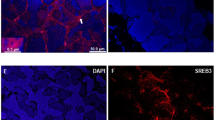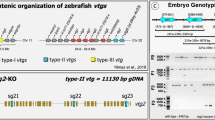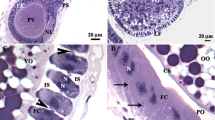Abstract
WHEN oestradiol is administered for the first time to male Xenopus the primary response is characterised by a latent period of 12–24 h before vitellogenin synthesis by the liver, or its secretion into the blood, is detected1,2. The response reaches a maximum at 10–40 d then slowly declines until by 35–40 d the liver has ceased to produce the protein. A second injection at this stage (induction of secondary response) causes a rapid re-acquisition of vitellogenin synthesis with a much reduced lag period (3–12 h), with maximum levels of vitellogenin synthesis being reached much earlier1,3,4. No satisfactory explanation has yet been found for this difference in lag periods, especially as RNA synthesis is known to be stimulated with little delay (2 h), even during primary induction5,6. We therefore asked the question of whether the drastic reduction in the lag period could be due to differential rates of utilisation of vitellogenin mRNA induced by the hormones.
This is a preview of subscription content, access via your institution
Access options
Subscribe to this journal
Receive 51 print issues and online access
$199.00 per year
only $3.90 per issue
Buy this article
- Purchase on Springer Link
- Instant access to full article PDF
Prices may be subject to local taxes which are calculated during checkout
Similar content being viewed by others
References
Clemens, M. J. Prog. Biophys. molec. Biol. 28, 71–107 (1974).
Tata, J. R. Cell 9, 1–14 (1976).
Clemens, M. J., Lofthouse, R. & Tata, J. R. J. biol. Chem. 250, 2213–2218 (1975).
Berridge, M. V., Farmer, S. R., Green, C. D., Henshaw, E. C. & Tata, J. R. Eur. J. Biochem. 62, 161–171 (1976).
Whittliff, J. L., Kai-Lin, L. & Kenney, F. T. Biochim. biophys. Acta 269, 493–504 (1972).
Tata, J. R. & Baker, B. Biochem. J. 150, 345–355 (1975).
Green, C. D. & Tata, J. R. Cell 7, 131–139 (1976).
Wittliff, J. L. & Kenney, F. T. Biochim. biophys. Acta 269, 485–492 (1972).
Ryffel, G., Wahli, W. & Weber, R. Cell 11, 213–221 (1977).
Shapiro, D. J. & Baker, H. J. J. biol. Chem. 252, 5241–5250 (1977).
Baker, H. J. & Shapiro, D. J. J. biol. Chem. 252, 8428–8433 (1977).
Deeley, R. G., Udell, D. S., Burns, A. T. H., Gordon, J. I. & Goldberger, R. F. J. biol. Chem. 252, 7913–7915 (1977).
Shapiro, D. J., Baker, H. J. & Stitt, D. T. J. biol. Chem. 251, 3105–3111 (1976).
Palmiter, R. D. Cell 4, 189–197 (1975).
Clemens, M. J. & Tata, J. R. Eur. J. Biochem. 33, 71–80 (1973).
Maenpaa, P. H. & Bernfield, M. R. Biochemistry 8, 4926–4935 (1969).
Lewis, J. A., Clemens, M. J. & Tata, J. R. Molec. Cell. Endocr. 4, 311–329 (1976).
Author information
Authors and Affiliations
Rights and permissions
About this article
Cite this article
FARMER, S., HENSHAW, E., BERRIDGE, M. et al. Translation of Xenopus vitellogenin mRNA during primary and secondary induction. Nature 273, 401–403 (1978). https://doi.org/10.1038/273401a0
Received:
Accepted:
Issue Date:
DOI: https://doi.org/10.1038/273401a0
This article is cited by
-
A correlated morphometric and cytochemical study on hepatocyte nucleolar size and RNA distribution during vitellogenesis
The Histochemical Journal (1988)
-
Phospholipid synthesis in the fat body endoplasmic reticulum during primary and secondary juvenile hormone stimulation of vitellogenesis inLeucophaea maderae
Wilhelm Roux's Archives of Developmental Biology (1984)
Comments
By submitting a comment you agree to abide by our Terms and Community Guidelines. If you find something abusive or that does not comply with our terms or guidelines please flag it as inappropriate.



